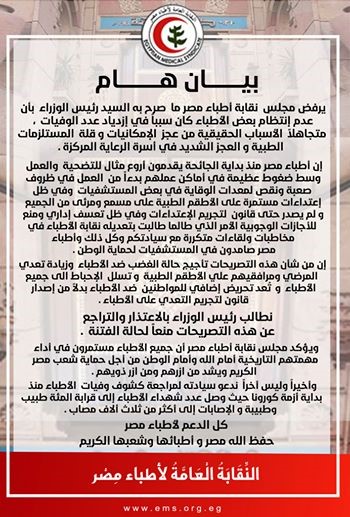Weekly Bulletin From 20 juin to 03 July

This post is also available in:
![]() Arabic
Arabic
Libya
The international conflict intensifies over Libya and the distance of the parties involved in the Libyan crisis increases due to conflicts of interests and differing visions about the future of the country, in light of Libya entering a new transitional period. In light of this difficult situation, the Libyans remain the weaker party in an equation that determines their fate, and it seems that the inter-state conflict is no longer a domestic war zone in the country as much as it is an international confrontation arena currently centered on control of Sirte, Al-Jafra Tabkoul, hence the oil Crescent area in the country.
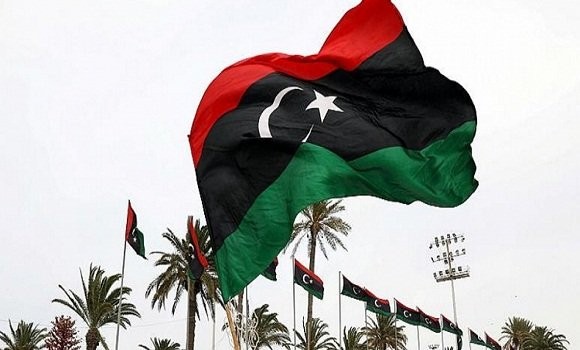
The Arab role returned modestly through the statement of the Secretary-General of the League of Arab States, where the Secretary-General of the League of Arab States, Ahmed Abou El Gheit, returned to condemning all forms of foreign military interventions in Libya, and made it clear that the military option will not solve the conflict and will not achieve victories for either party. In his speech during Arab League foreign ministers’ meetings Abou El Gheit stated that there is no way but a comprehensive political solution through a UN-sponsored process as confirmed by the Leagues decisions, and agreed upon by the parties involved in the Berlin track. This requires, in his opinion, an end to the fighting and an immediate calm on all lines of confrontation, especially around the city of Sirte, and to enable the Libyan parties to return to the negotiations of the Joint Military Commission sponsored by the United Nations in order to reach a permanent ceasefire agreement. Aboul El Gheit explained that any ceasefire arrangements will not succeed unless they are accompanied by clear obligations to remove mercenaries and foreign fighters from the country, as he described.
Abou El Gheit referred to what he described as the constructive proposals mentioned in the Cairo Declaration, explaining that the League appreciates any effort to resume political dialogue between Libyans, especially when it is an Arab effort, as long as it is based on launching a political process led by the Libyans themselves, and sponsored by the United Nations.
Meanwhile, the French-Turkish dispute is emerging again, following the fact that Turkey sent military advisers and drones to Libya that have contributed to changing the course of the conflict. There has been a dispute for nearly a year on several issues between NATO members France and Turkey, the most important of which is the Libyan file and immigration. French President Emmanuel Macron earlier launched a violent attack on Turkey because of its role in Libya, accusing it of playing a “dangerous game” that could not be tolerated, as its rapprochement with the Egyptian President and his recent initiative became clear. The Turkish response was similar.
Regarding the options of the Egyptian and Turkish parties, both of them do not seem excluded from the military choice, but this choice remains difficult at the present time, even with neither side agreeing or committing to a ceasefire, or even a peace agreement to bring views closer, in order to preserve wider options in the ongoing conflict.
Moscow, for example, and despite standing behind Haftar, will continue to work on various fronts, as it will continue to hold talks with Turkish officials. It has previously supported and will support any ceasefire proposal, and at the same time will search for the possibility of securing the presence of military bases in the Mediterranean.
Meanwhile, field options remain crucial for the government of National Accord and its supporters. The government of National Accord is trying to regain the city of Sirte and Al-Jafra in the middle of the country in addition to other four strategic cities. The importance of these cities resides in the fact that they include the main port in central Libya. Turkey will also have the opportunity to secure its interests in the Mediterranean Sea, and by controlling the entire area of Al-Jafra, it will neutralize the military supply point that Haftar and Russia use as the air base in the middle of the desert. This is what the government of the National Accord considered a declaration of war. Egypt is moving in Libya under the influence of several issues, starting with the Renaissance Dam and terrorism in Sinai, while the Turkish presence, which has been gradually strengthening for a while, has become a real concern.
The issue of oil production in Libya remains central and very important. Speculation has increased of an imminent resumption of Libyan oil production, after several months of almost total stoppage, after forces loyal to the Libyan Major General Khalifa Haftar controlled most of the oil fields in southern and central Libya, and this comes amid intense efforts by the United States and the European Union to launch a truce in Libya that is among its elements are the resumption of oil exports. The latter consider the only near source of the Libyan treasury revenues, in exchange for the government of National Accord’s forces stopping their efforts to control the city of Sirte and the base of Jafra.
The National Oil Corporation of Libya indicated on Wednesday 01 July that the situation of force majeure imposed on oil exports continues while waiting for the lifting of the “siege on the ports by the Oil Facilities Guard Agency” of the General Command Forces, after six months of closure in the framework of the civil war.
The Corporation confirmed that, based on the ongoing negotiations to resume oil production between the government of National Accord, and a number of regional countries behind this closure, under the supervision of the United Nations and the United States, it issued instructions since June 20 to all operating companies to call employees to work sites, and start preparing for reproduction operations Maintenance and progressive operation of fields. There is also an oil tanker currently sailing towards the Sidra port to start loading the crude in the port’s tanks. Tribal balances in the oil region remain somewhat influential in restoring activity back to his predecessor, as some statements and statements from tribal leaders on the matter came out, especially after the National Oil Corporation said that international talks were under way on resuming production.
The return of oil production raises many questions about an insurance mechanism, and given the international intervention in this regard, the fear of international trusteeship over the Libyan oil sector which is the main source of income in the country, is serious and real.
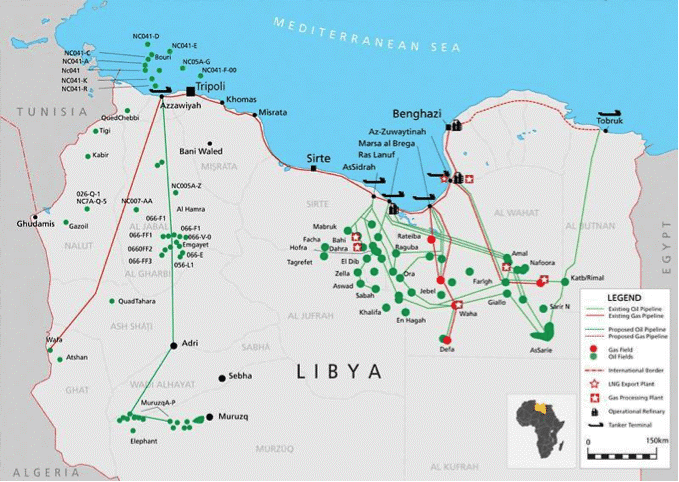
In the meantime, there are no indications of a permanent armistice based on the current locations of the two parties to the fighting in Sirte, as the Government of National Accord seeks from the first side to seek to enhance the size and nature of its forces in the vicinity of the city, and also towards the fighting axes in eastern Sirte. While the General Command forces continue their flights in several areas around it, and its artillery has bombed locations and concentrations of the government of National Accord’s forces near the Bouirat Lahsoun region, west of the city, for its part, Issa al Uraibi, head of the Energy Committee in the Libyan Parliament, revealed that the the government of National Accord refused to sign a cease-fire. Responsible for delaying the resumption of oil production.
In addition, the the government of National Accord faces a stifling financial crisis in light of the continued closure of oil fields during the first five months of this year, which threatens to default in the payment of salaries during the coming months with a lack of liquidity, a worsening budget deficit, and the economic repercussions of the Coronavirus pandemic.
Regarding the European role, the European Union extended its mission to Libya on Thursday, July 02, until July of next year 2021. The mission said it is committed to support the stability of the security and justice sectors in Libya, to support the security and management of borders, to protect human rights and to defend the security and the safety of women. It is reported that the European Union mission has been operating for some time from Tunisia, and recently launched an initiative to assist the country in the transition to democracy and stability, in accordance with the objectives of the initiative.
Tunisia
On the legislative level, the General Legislative Committee held a session on Thursday 02 July 2020, during which it presented its report on Bill No. 25-2015 related to the repression of offenses against the armed forces. The committee decided to submit the report to the council’s office after including all the observations to transmit it to the plenary session.
It should be recalled that the draft law is still in its draft, which had previously sparked controversy, and was widely rejected by Tunisian civil society and public opinion. DAAM center has previously issued a research paper in this regard on its shortcomings, which could open a door for numerous human rights violations. Therefore, the draft law should be subject to follow-up by organizations active in human rights and by the media in order to open an open dialogue and pressure to pass a law aligning with the constitution and the principles of international law in this regard.
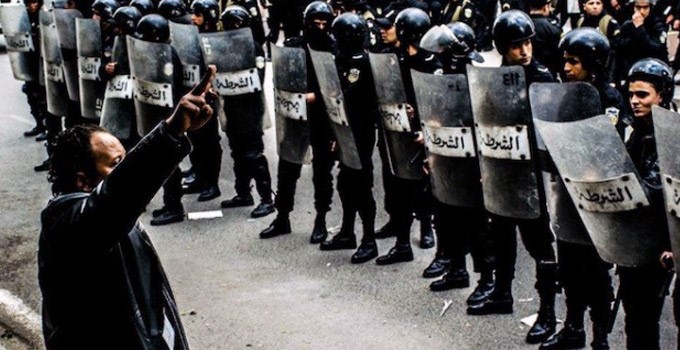
At the governmental work level, the outputs of the Ministerial Council regarding the recent protests in Tataouine have been far from expected for Kamour coordination committee. The official spokesman for the sit-in of Kamour, Tarek Al Haddad, confirmed their rejection of the outputs of the ministerial council for the region, which was held on July 01th. The official spokesman added that the coordination session was held in parallel with the Ministerial Council, and the youth decided to escalate the following day, where a protest stand will be organized in front of the headquarters of the Regional Labor Union to ask it to put pressure on the government and the companies existing in the region to implement what came in the Kamour agreement, in addition to taking several escalatory steps to be implemented successively.
The Ministerial Council decided to hold an excellent regional council for development within the coming days at the governorate headquarters, under the supervision of the Prime Minister. The public policy of the Tunisian state remains, in the period of democratic transition, hostage to previous mistakes and improvisation that follows events away from a strategic vision capable of changing the mode of political, economic and social development in the country. This puts the ceiling on actual change in Tataouine and others always less than what is required. The foregoing is inseparable from the political crisis, which has become part of the existing system, without an effective solution to what the parties deal with according to the narrow logic of party interest. The government of Elyes Al-Fakhfakh was criticized by many political parties, some of which attempted to withdraw confidence from it, while others asked it to resign. Al-Arayidh confirmed his support for this government, after Al Nahdha Choura Council approved this option, given its efforts to combat the Corona pandemic and to run the country in a short period of time, he said. However, Ali Al-Arayidh insisted that the support of Al Nahdha Movement, according to what was approved by the members of the Al Nahdha Choura Council in Hammamet, is subject to the pledges of the institutions committed to the investigation (a parliamentary committee, the Public Monitoring and Judicial Investigation Commission in the Economic and Financial Pole) on suspicion of conflicts of interest and suspicion of corruption.
Regarding the expansion of the ruling coalition, Choura Al Nahda Council recalled the movement’s position calling for the expansion of the ruling coalition to ensure more political support from the parliamentary blocs and political parties. This figure, in one aspect, indicates a conflict of interests that threatens the government itself and contributes to an overall deterioration of the situation in the country.
Concerning the suspicion of corruption and conflict of interests mentioned above regarding the head of government, the head of the National Anti-Corruption Commission, Chawky Al Tabib, asked the Administrative Reform and Good Governance, Anti-Corruption and Control of Public Funds Committee to approve a closed session to provide data that include confidentiality, according to the law related to the file of suspicions of conflicts of interest related to the deals concluded between the Tunisian state and a company that the head of the government owns a portion of its capital. Chawky Al Tabib, said at the opening of the session that the content of the statement of the head of the government Elyes El-Fakhfakh of his interests and gains has not yet been published, similar to the statement of gains related to the President of the Republic, parliamentarians and the category concerned with the permit from 1 to 8, due to a legal problem related to the non-issuance of the order related to the publication of the content of the statement.
For his part, Badr Addin Al-Gamoudi, head of the Administrative Reform, Good Governance and Anti-Corruption Committee, said that the quorum for the presence of deputies is weak and does not allow passage to vote on the secrecy of the session related to suspicions of conflicts of interests related to deals concluded between the Tunisian state and the company that the head of the government owns part of its capital. He added that previous sessions had been decided on its confidentiality, but the data that were presented in it did not rise to secrecy, but were data circulating in the media. The proposal to covert listening to the vote was presented and rejected, which sparked controversy among the committee member for the People’s Movement Haykal Al-Makki, who accused the committee that its work had become politicized and would produce an unbalanced and politicized investigation.
For his side, Loumi, who represents the heart of Tunisia party, expressed his refusal to accuse the committee, explaining that the matter related to a file that has become a public opinion issue and was supported in this position by the committee member for the Dignity Coalition, Mohamed Al-Affas. It is possible at this level to note the narrow political conflicts that exploit every possible file to achieve political gains on the expense of the other party.
At the local level, the Independent High Electoral Commission issued decisions to resume the implementation of the partial municipal electoral calendar in 9 municipalities, after the expiry of the deadlines due to the Covid 19 (Corona) pandemic and the accompanying quarantine measures, whether comprehensive or directed.
Two election campaigns have started since June 21 and will continue until Friday, July 3 in:
- The Municipality of Jebeniana, from the governorate of Sfax
- Hassi Al-Farid Municipality from the governorate of Kasserine
- Electoral silence and security and military polling day: Saturday, July 4
- General polling day in the two municipalities: Next Sunday, July 5th
- Partial elections in seven municipalities: next August 30th
The election campaign will take place between August 17 and 29. The partial elections concern the following municipalities: Kesra (Siliana), Al-Marji (Al-Kef), Korba (Nabeul), Fousana (Kasserine), Al-Saheline, Zawiyat Kontosh (Monastire) and Chbika (Kairouan).
On the human rights level, in a sudden step, the police forces used excessive force to resolve the sit-in of Phd holders and researchers at the University of Sfax, and 4 arrests were recorded among the holders of doctoral degrees, respectively
- Ramzi Al Falihi -
- Cherif Al Housseini -
- Waseem Al Bahar, who was the victim of a violent attack -
- Naguib Al-Akrami.-
Unemployed Phd holders called on all components of society to show solidarity with them in this ordeal, calling on the Deanship of Lawyers to intervene in order to release the detainees. They consider all responsible for the administration of the University of Sfax responsible for what happened.
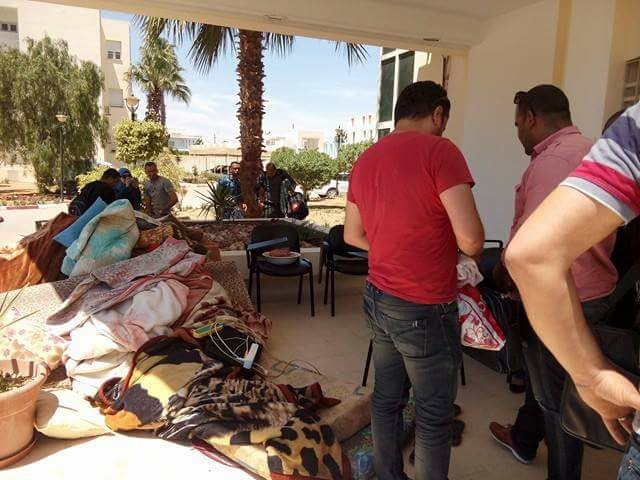
Egypt
The Egyptian Regime’s policies continue to reflect huge discrepancy, the Ministry of Health announced that the total official numbers of certified coronavirus infections is 71299 cases, including 19,288 cases that were cured and went out of isolation and quarantine hospitals and 3120 deaths. At the same time, the security forces imposed a tight siege and security procedures around the Egyptian Medical Syndicate and prevented doctors from entering and to prevent a press conference that was scheduled to respond to the Prime Minister’s statement which he blamed doctors. The Syndicate’s official Facebook page announced postponing the conference for technical difficulties until further notice.
The Egyptian Medical Syndicate is working in counting the number of victims related to the medical profession who has fallen while combating Coronavirus under the slogan of “Glorify your Martyr”. This happened especially after the released statement of the Prime Minister in which he blamed doctors for failure to act and perform their duties, which led to a surge in the number of coronavirus fatalities and deaths. The Syndicate asked for an official apology from the Prime Minister, and demanded from him to back up on this statement so as not to incite any seditions.
Meanwhile, on Friday 03 July 2020 the Egyptian Medical Syndicate mourned Dr. Ayman Ahmed Zaki , the gynecologist who died at Nasr Isolation Hospital, Helwan.
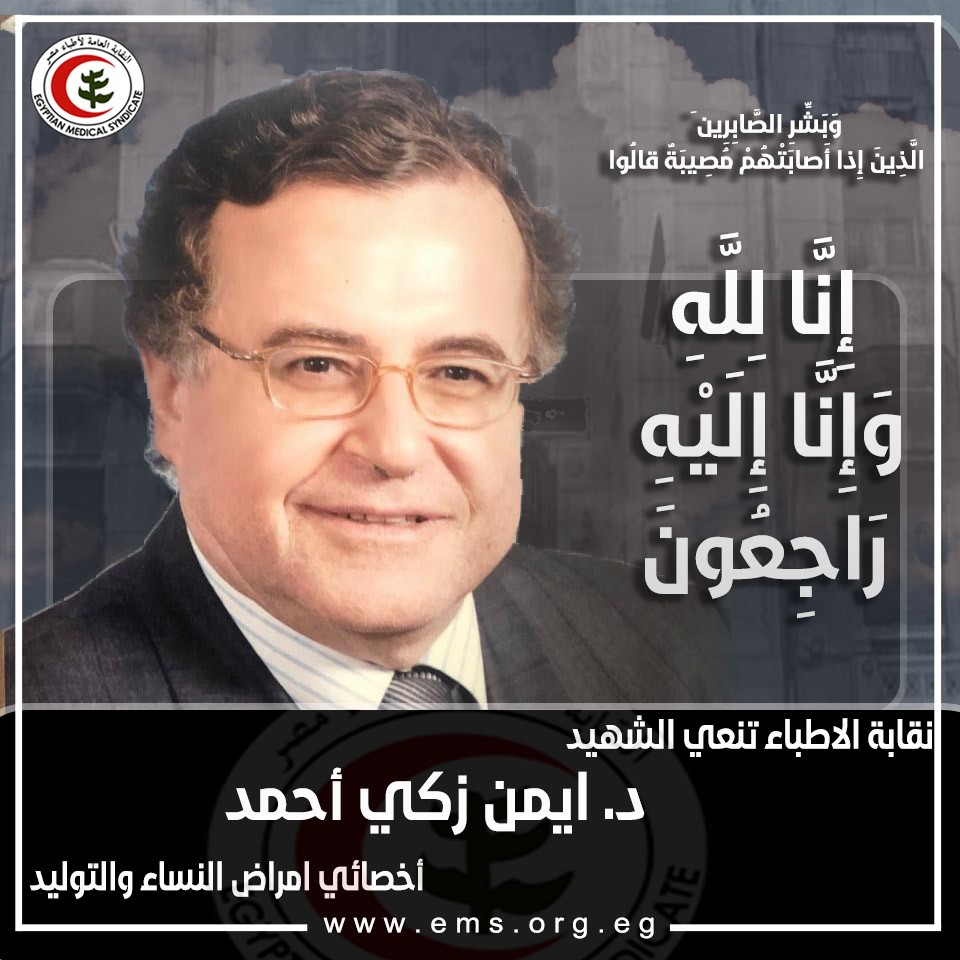
The Regime’s policy discrepancy continues, after a tense confrontation with doctors, and after charging small employees the burden of the epidemic and its economic costs, the planning and budget Council at the Parliament of Egypt approved yesterday, a draft law proposed by the government on symbiotic contribution to face the economic consequences of the epidemics and natural catastrophes. The draft law proposed a 1% deduction of all workers’ wages whose wages are more than 200 Egyptian Pounds, and another deduction of 0.5% from all pensions that are over 200 pounds. Collections of this law will be turned into a fund to face the consequences of the epidemics and natural catastrophes. The Council also approved a draft law that obliges every car owner who use electronic equipment for entertainment to pay 100 Egyptian Pounds as annual fees. These laws poses questions about transparency of dispersing these funds or money.
On human rights level, The Egyptian Medical Syndicate has corresponded the General Prosecutor- Hamada Al-Sawy regarding arresting Dr. Muhammad Moataz Mandour Al-Fawal – member of Al-Sharkiya Medical Syndicate- who was arrested pending investigation in case No. 588 for the year 2020 in response for the Prime Minister’s statement which aroused the doctors anger. This happened despite the executive regulation No. 45 of 1969, issued by resolution No. 235 of 1974 stipulated in Article No. 62 paragraph (b) that it is not permissible to hold a Syndicate member accountable for his Syndicate’s activism. The Syndicate demanded the release of Dr. Muhammad until the completion of investigations.
Finally, at a high paid cost, Dr. Laila Suief received a correspondence from the political activist Alaa Abd El-Fatah who is detained in pre-trial detention in Turra Prison. This happened after his family sought all legal ways and made a sit-in protest in front of the Prison’s gate where Dr. Laila was beaten up and dragged over the street and his sister Sanaa Seif was arrested on charges similar to those of her brother.
The above image is reminiscent of the harsh oppression where a mother is left on the streets awaiting a comforting news about her son who was imprisoned in all ages and generations from Mubarak to El-Sisi. After the death of the father, the leftist activist Ahmed Seif Al-Islam, the family inherited the path of struggle to liberate Egypt. Alaa’s sisters suffered from a set of violations that reflect unfairness and injustice just in front of Courts and prisons’ gates.
In addition to the aforementioned, pre-trial detention, continue to be used as punishment for youth and activists, as the Ninth Circuit of Al-Mansoura Court renewed activist Mohamed Adel’s pre-trial detention for 45 days, violating by this decision Article 145 Criminal Procedures Code, as he exceed the legal time limit of pre-trial detention which is 2 years in prison.
From Tik-Tok to Prison: The road to prison is open as a result for the Egyptian Prosecution’s moral campaigns
The public prosecution and the Judicial System continue to carry out their “moral” campaigns, as the First Circuit of Cairo’s Economic Misdemeanor Court handed over a verdict punishing Sama Al-Masry with 3 years of imprisonment and a fine of 300 thousand Egyptian Pounds for being charged of inciting debauchery and spreading immorality.
The Reference order of the defendant -which was issued on October 2019 from Al-Azbakya Police Station, Cairo- stated that she intentionally published anti-public chastity photos and videos that reveal her body, accompanied by sexual insinuations and connotations through her personal accounts on social media “Facebook- Instagram- YouTube” as investigated.
Dokki’s Prosecution also decided detaining Renad Emad 4 days pending investigation and charged her of providing anti-public chastity videos and content, which can be classified as pornography through social media websites “Tik-Tok”.
Moreover, Benha Prosecution decided detaining Manar samay “AKA: Tik-Tok girl” and her friend Zika 4 days pending investigation, with continuous renewal for “publicizing herself through social media websites by providing anti-public chastity videos with intention to practice prostitution, incite debauchery and spread immorality”.
Finally, Unfairness and violating activists’ rights series continues as usual, as the Court of Cassation handed over a final verdict to commute the criminal verdict that was issued against the officer who murdered political activist Shaimaa Al-Sabagh from 10 years to 7 years of rigorous imprisonment. this incident goes back to 24 January 2015 in the 4th anniversary celebrations of the 25th January revolution.
Regarding the latest developments in the spread of the virus in Egypt, Tunisia and Libya
Last upadate04/07/2020 13 pm
Egypt
Libya
Tunisia
This post is also available in:
![]() Arabic
Arabic
